Trending
Opinion: How will Project 2025 impact game developers?
The Heritage Foundation's manifesto for the possible next administration could do great harm to many, including large portions of the game development community.

Featured Blog | This community-written post highlights the best of what the game industry has to offer. Read more like it on the Game Developer Blogs or learn how to Submit Your Own Blog Post
I use our game "Political Animals" to try to understand how the 2016 US election was won.

Donald Trump won a stunning victory in the 2016 US Election yesterday. Regardless of how you feel about the President-Elect, you have to give it to him and his team for tapping into an undercurrent of fear and anger against the Establishment/Elite and utilizing it to win a victory. When we started making Political Animals, I had a silly dream of political commentators using the game to analyze actual Political events. Given the game's slow sales, that's not likely to happen, so if you'll indulge me I'll do a little armchair political analysis using my own game.
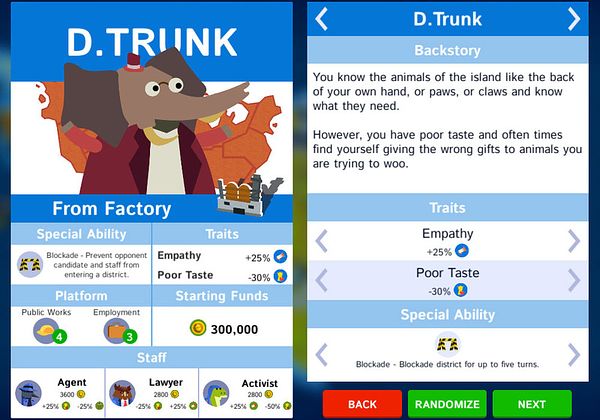
Candidate Donald Trunk (ha!) understands (some might say panders to) and empathizes with the needs of the citizens in a way that no other candidate (with the exception of Beary Sanders) does. However, he is criticized for having a potty mouth and poor taste, and thus has difficulty attracting political patrons to his side. His special ability, while not realistic, is the ability to build a wall around a district and prevent his enemies from coming in.
His platform is Public Works and Employment. His staff Include an Agent to fabricate scandals, a Lawyer to help cover up his own scandals, and an Activist to further enhance his rallies. His homebase is in the Factory district, which isn't actually true but represents his campaign's strategy to woo Rust Belt voters.
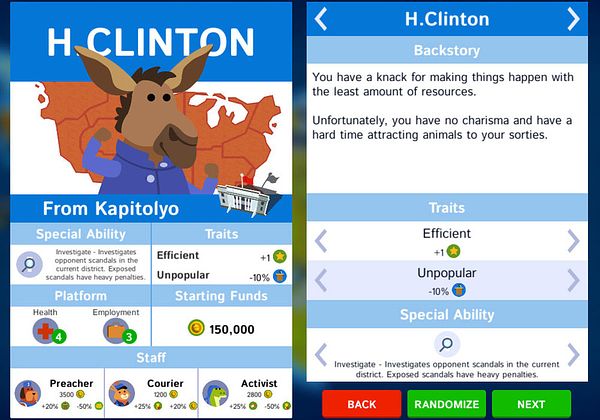
Hillary Clinton (sorry I could not think of a pun) on the other hand is known as an efficient and extremely hard worker but is also one of the most unpopular candidates in recent history, meaning she doesn't do very well at attracting people to vote for her. Her platform is Health and Employment. Her staff include a Preacher to help her generate even more logistics to move and operate her staff, a courier that helps her get around and speak to patrons, and an Activist to supplement her lack of charisma. Clinton's headquarters is in the Kapitolyo (aka Capitol) which again isn't entirely true but is emblematic of the perception that she represents the establishment.
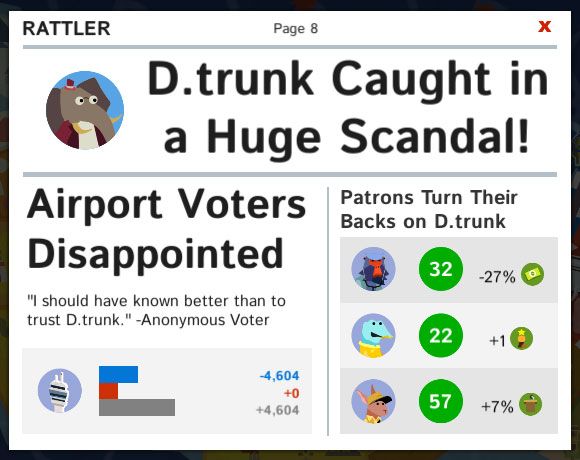
Donald Trunk had to deal with a lot of smaller scandals on the campaign trail, but showed a remarkable ability to shrug them off with little effect. Hillary was dogged by a few scandals which had a much bigger impact on her campaign.
The current mechanics of the game allow for a candidate to win despite multiple scandals, so it's very possible for a Trunk-like candidate to win in Political Animals. It would be even easier if he used a lawyer to settle some of those scandals.
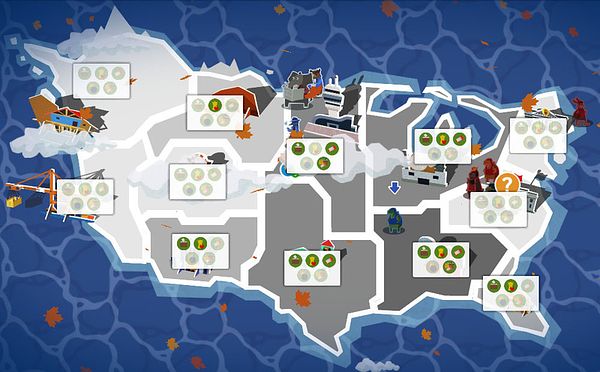
Political Animals maps the concerns of undecided voters as well. They're affected by a variety of things including how popular a candidate is in their district, who has more scandals, and who visited their district most often. It also has a reputation decay mechanic a candidate will lose support in districts that they have not visited for a long time.
There's been much ado about the collapse of Hillary Clinton's Blue Wall, particularly in the State of Wisconsin. She didn't visit it because her campaign assumed she would be a shoo-in there, which proved to be a costly mistake.
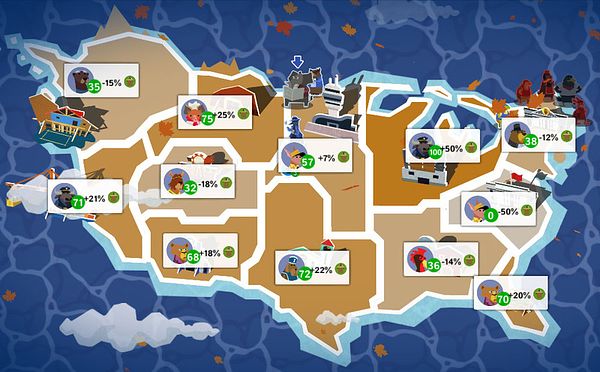 Political Patrons in Political Animals represent a lot of different things, but they are essentially local leaders that hold a lot of sway in their communities or followers. In the game there are three types of patrons : Influential, Wealthy, and Popular. These patrons control access to Logistics (efficiency), fund raising, and campaigning, respectively.
Political Patrons in Political Animals represent a lot of different things, but they are essentially local leaders that hold a lot of sway in their communities or followers. In the game there are three types of patrons : Influential, Wealthy, and Popular. These patrons control access to Logistics (efficiency), fund raising, and campaigning, respectively.
In this election Donald Trunk had difficulty attracting the support of patrons like conservative talk show host Charlie Sykes and prominent members of the Republican party. Clinton, on the other had, not only had Republicans deciding to vote for her but also had celebrities as wide ranging as Beyonce and Lebron James all the way to working class icon Bruce Spingsteen supporting her.
Political Animals uses Patrons as an in-game balance against pure populism. In some ways we may have given them a little too much importance. So if the real world mimicked Political Animals, Hillary Clinton might have won the election over Donald Trunk. But it was not to be, as we'll see when we discuss the issues.
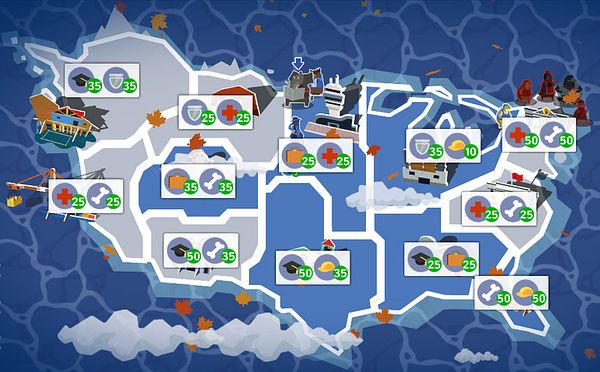
I'm not gonna lie, I was surprised at how closely this Issues overlay mapped (the real) Donald's map to victory. The areas highlighted in blue are generally the areas that he won and the areas in gray map Hillary Clinton's states. Obviously there are some differences because this isn't really meant to be a map of the US, but still, kind of surprising.
So this is where Political Animals as a simulation kind of falls apart. We (and the pollsters, apparently) did not expect how much impact the issues would have on these elections. Our mechanics connect the concerns of a district to the success of a candidate's campaigns, but not to the extent seen during the elections. It's as if our fake Donald Trunk hacked into the game and adjusted the formula to greatly increase the effect that playing to the issues of electorate had.
Hillary lost this battle almost completely. I read recently that former president Bill Clinton had some issues with Hillary's campaign manager about the lack of a clear message (his campaign famously coined "It's the economy, stupid"). I tend to agree, and so does this article. Towards the end their campaign centered around "Stronger Together", which is nice but pales with "Make America Great Again." If I was in charge of their messaging, I would have used "Let's Get to Work." It would have enhanced her workaholic credentials while at the same time assuaging the fears of the millions of blue collar workers that felt left behind in previous administrations. She could have even struck a Rosie the Riveter pose for campaigns to help cement her as a feminist icon.
The elections are now over, and it seems it was won primarily on a strategy of playing to the legitimate concerns of people who felt left behind. It should be mentioned that playing to those concerns also included a lot of hateful rhetoric from the side of Donald Trump, but ultimately it seems that this election was won because of a failure of strategy on the Clinton campaign. That is at the heart of what Political Animals is about. Politics is hard work, and in many ways the Clinton campaign was outsmarted and outworked by the Trump campaign.
On quite a few occasions we have been accused of making a cynical game. I think that's the farthest thing from the truth. I personally would describe myself as falling somewhere between a pragmatist and an optimist. We've simply described the political landscape (not only in the US, but around the world) as we see it. We've tried to make it balanced so that any kind of candidate can win. At the end of the day if you believe in your ideals you have to fight for them during the elections. You cannot simply assume that people agree with or will follow you.
Lastly, I hope you'll forgive me for being a little sentimental, but if we've convinced even this one person that playing clean is a valid political strategy, all the effort that went into making this little game was well worth it.
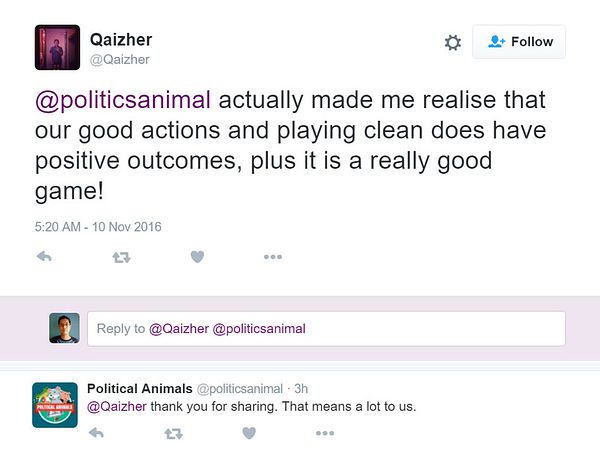
Thanks for reading. Political Animals is out! If you're a games journalist or streamer that wants a review copy, please check out our press kit and distribute() link. If you'd like to be updated on the latest Political Animals news, please sign up for our mailing list, join our Facebook group, or follow us on Twitter.
You May Also Like